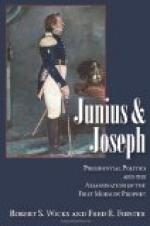“Do you not know where the Rigdons live?” she asked.
He was chewing tobacco, and now he spat upon the ground, not rudely, but as performing an habitual action in a moment of abstracted thought. “Oh, I know well enough, but if ye won’t mind my saying a word to ye, young lady, I’d advise ye to put up somewhere else. I’ve got darters of my own—in course I don’t know who ye may be or what ye may be doing here.” This last was added in an apparent attempt to attain to some suspicion that he felt to be reasonable.
“You think ill of them because you despise their sect,” she said gently, “but I am the wife of one of the elders.”
“Have ye got hold of some news that ye’re carrying to them?” He evinced a sudden interest that appeared to her extraordinary.
“What news?”
“Oh, I don’t know. I jest thought ’twas queer, if you’d got hold of anybody’s secrets, that you should be asking where they lived, straight out and open in the street like this.”
His words suggested to her only the idle fancies of prejudice. Some other people drew near, and, dropping her veil, she was starting in the direction in which he pointed when he spoke again in a more determined voice. “You jest tell me one thing, will you?” He even laid his hand upon her bridle with authority, “Are ye going to stop at Rigdons’ all night?”
“No.”
“Sartin?”
When he received her reply he let go the bridle, saying in warning tones, “Well, see that ye don’t do it, that’s all.”
The incident left a disagreeable impression on Susannah’s, mind, but she did not attach any distinct meaning to it.
Rigdon and his wife were both within. Rigdon locked the door when Susannah had entered. Then with crossed arms, standing where he could watch against intruders from the window, he began to tell her news of import. His mother, who was an old woman, his wife, and some younger members of the family, gathered round.
The light fell sideways upon his thickset form and large hairy face. His manner was the result of struggle between effort for heroic pose and an almost overmastering alarm. His matter was the evil conduct of the surrounding Gentiles toward the Saints. It seemed that in this and neighbouring places, evangelistic meetings had been held in which Presbyterians, Baptists, and Methodists had joined, and Rigdon averred that the preachers had used threatening and abusive language with regard to the Saints. A series of such meetings had begun in Hiram, small as it was; and Joseph Smith, like a war-horse scenting the battle, had set aside his arduous task of correcting the Old Testament and gone forth to preach in the open air. At first he had been greeted only with derision or pelted with mud, but in the last few days he had made and baptized converts, and now the fury of the other sects was at white heat.
Susannah’s mind swiftly sifted out the improbabilities from Rigdon’s wrathful tale.




